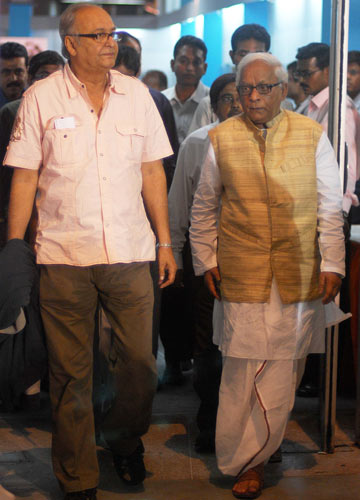Bengali actor Soumitra Chatterjee could very well be called one of India’s finest actors of all time even when he never worked in Hindi cinema or any other regional language. Shyam Benegal wanted him in Mumbai, so did Hrishikesh Mukherjee. But Chatterjee politely said “no” to everyone. He received offers from Hollywood as well, as sources said, which also he never accepted.
He was awarded the Dada Saheb Phalke award and the Legion of Honor, France's highest civilian award.
“The most important part of your acting skill is how you throw words. If you don’t know the language well, it will not happen. So, your acting will not flourish,” he had once said. Many legendary directors were, therefore, deprived of this great Bengali actor who could have been so prolific in the roles given to him in international films. But despite that, his work stretched far beyond the Bay of Bengal. He was considered an actor of eminence and excellence of world stature.
A master in Bengali literature, Chatterjee was a result of a rigorous talent hunt by legendary filmmaker Satyajit Ray, who debuted him in Apur Sansar (The World of Apu) in 1959. The film was part of the trilogy written by Bibhutibhushan Bandyopadhyay.
The first part of the trilogy was Ray’s first movie, Pather Panchali, the Indian classic that not only put Ray on the world map but did the same for Indian cinema as well. The second in the trilogy was Aparajito, which Chatterjee missed by a whisker as Ray thought he was too old to fit the character of Apu, who actually should be in his teens. Chatterjee had just turned 18 then.
But within a couple of years, when Ray started Apur Sansar, the man who flashed before his eyes was none other than Chatterjee. A tall, charming man with a cherishable voice—loud enough to fit the stages of Bengali theatre. Chatterjee had by then established himself in Bengali stage theatre.
Apur Sansar’s success was not only the success of Ray; it was bestowed proportionately on Chatterjee as he drew the attention of iconic film critics and filmmakers world over. The film was appreciated in the world’s literary magazines and the relationship between Ray and Chatterjee began which lasted till Ray’s death.
In his almost three-and-half-decade-long relationship with Ray, Chatterjee portrayed major characters in Ray’s 14 films, all of which are considered assets for Indian cinema industry. Those include portrayal of Ray’s detective Feluda in Sonar Kella and Joy Baba Felunath.
Chatterjee was equally responsive to the audience of commercial cinema as he was a commercially hit star of Bengali film industry, often challenging the iconic Bengali superstar Uttam Kumar. He won the hearts of people through the audience’s judgment of his versatile acting prowess. He acted in over 200 Bengali films and countless Bengali plays, one of the most prominent ones being the Bengali adaptation of Shakespeare’s King Lear. He was so well read that even when he acted in the Bengali version of a play or cinema, his portrayal of characters was always at par with global standards.
He himself was a critic and gave his judgment to the national jury board which often neglected not only him but Ray as well. The national jurists only woke up when Ray’s movies were making waves in world cinema and he received global recognition. The same happened to Chatterjee as well. A couple of times, he refused to accept coveted national awards, even mocking them as intellectually bereft.
The veteran actor was aligned to the leftists in Kolkata. He was a personal friend of former West Bengal chief minister Buddhadeb Bhattacharjee. When the three-and-half-decades-old left front government collapsed in Bengal, Kolkata saw a shifting of intellectuals to the Trinamool Congress. Chatterjee was a rare exception who never thought it right to shift ideology from left to centre. Instead, he remained with the defeated group.
He was an extremely workaholic man who also chose to fight the novel coronavirus. For this 85-year-old thespian, work was not meant to be compromised just because a virus was out there. Chatterjee decided to challenge the deadly virus even if he had co-morbidities like prostate cancer, COPD and heart diseases. He, as a result of that, decided to resume two films simultaneously—one was on his life and journey. The journey, however, was cut short by the deadly virus.


